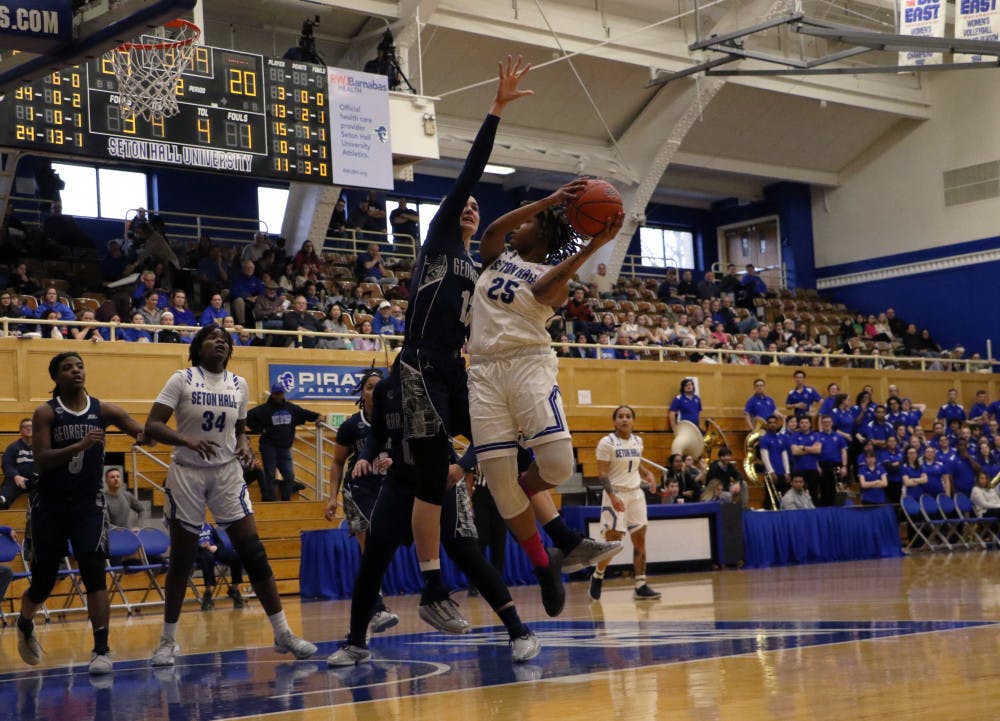Female students who join sororities showed an overall increase in body shame just one month after joining compared to those who did not join, according to a study conducted by a Northwestern University student.
The study which investigated the impact of sororities and the rush process on female body image, opened up discussion on whether this is an issue for sororities on Seton Hall's campus.
The study was conducted by Ashley Marie Rolnik for her senior honors thesis at Northwestern University. The results were published in a journal on springer.com called Sex Roles.
The study focused on 127 undergraduate women, from ages 17 to 20, at a mid-sized, private Midwestern university either participating or not participating in a sorority rush. There were 68 women who participated in rush and 59 who did not. The women completed online surveys at four time points.
The study predicted that participation in sorority rush would lead to increases in self-objectification and body shame.
The results found that women who chose to rush scored higher on self-objectification and eating disordered behavior and attitudes compared to women who chose not to rush. However, there was no evidence that participating in rush led to systematic increases in self-objectification and lower body image.
Mariel Pagan, assistant director for Greek Life, said of the 14 recognized on-campus sororities, some see body image as a concern.
"Some sororities do take it on as an initiative," Pagan said. "They are conscious and aware of it (as an issue)."
Sororities can sponsor activities or discussions to promote positive body image, Pagan said.
Pagan cited Alpha Phi and Lambda Tau Omega as two such organizations. Alpha Phi has a national effort to promote positive body image. Lambda Tao Omega has sponsored the program promoting body image titled "I Love My Body."
However, there have not been any recent programs promoting body image or consciousness.
As for the results of the study connecting sororities to lower body images, Pagan said, "I don't know that sororities equal lower body image. I don't have that experience."
Greek Life, as a whole, had not taken on body image as an initiative.
However, Pagan said Counseling Services does provide programming and information about body image and eating disorders.
"They have reached out to Greek Life," Pagan said. "They said that they can support sororities and provide information (to them)."
Pagan also said individuals have not come to her with issues about body image. Instead, she said, individuals with those concerns may have reached out to Counseling Services, instead.
Pagan said she has experienced members of sororities approaching her with concerns for someone else in their organization about wanting to do something for them, regarding different issues, such as academics.
Pagan said that she can help them deal with their issue or refer them for further guidance.
Sophomore Deizy Ulloa, Vice President of Lambda Theta Alpha, Latin Sorority, said in an e-mail interview that body issue has not been an issue for her sorority.
"Although we are a ‘Latin' sorority, my sisters are from all over the world and come in every shape, size, and form," Ulloa said.
Ulloa said that she does not think her sorority creates a negative body image, nor do the rest of the sororities.
"Our sorority does not rush, we basically have an interest group and if you are interested in our sorority, want to meet more sisters, and learn more about us you are allowed to join," Ulloa said. "There are no requirements to be part of the interest group."
Ulloa also said that, in addition to not having a rush, her sorority also hosts and supports programs about self-image.
"Over the years, we have and continue to support and host many programs and workshops about self-image and related topics," Ulloa said. "This past semester, another multi-cultural sorority held a great program on the different stereotypes and labels of different skin colors that brought about many discussions and feelings about that topic."
Senior Chantal Vergara, a social and behavioral sciences major and president of the Delta chapter of Omega Phi Chi Sorority Inc., said in an e-mail interview, that she does not think sororities cause lower body images for their members.
"My sorority in particular exemplifies quite the opposite," Vergara said. "I am a member of a multicultural sorority where all my sisters are different colors, shapes and sizes. We all have different body types, which show our potential pledges that we are a sisterhood that except all women. This is a misconception that the media places on sororities."
Brittany Biesiada can be reached at brittany.biesiada@student.shu.edu.





